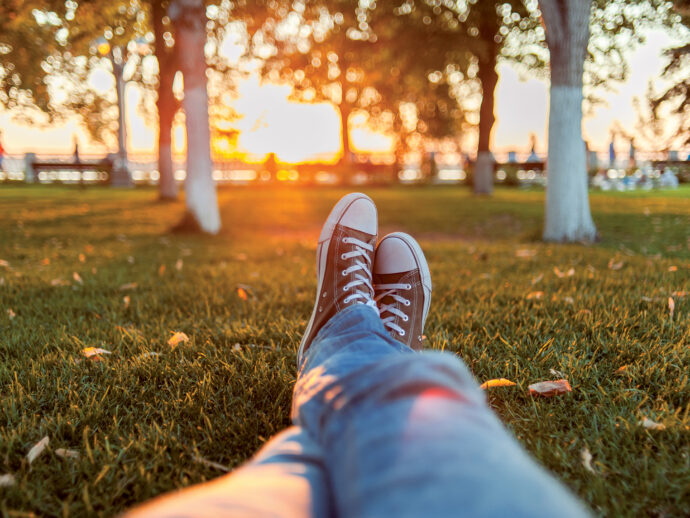
Every day at noon, Mike Russell takes a walk by the creek all the way to a small pool just upstream from a wooden bridge. Twenty minutes later he’s back in the office. “I could not do my work the way I do without this midday nature break, or my daily 30-minute morning walk to the office,” says Russell. Come weekends, he goes paddling or on long hikes. He says it’s a craving, of sorts, and satisfying the craving is what keeps him balanced.
Biodiversity—what’s the big deal?
Step outside. How wild is the landscape you’re in? It could be a garden patch or the canopy of trees you walk under if you live in the city, and the wildlife that calls it home. Biodiversity, defined as the variety of organisms that exist in a certain environment, human-managed or not, is an essential contributor to our well-being, physical and mental. We feel better when close to nature, which is why we need to redesign shared habitats to address this inescapable and worthwhile connection.
“Biodiverse nature has the most impact on our mental well-being, which seems to be due to the increased multisensory engagement such as sounds from animals in habitats, diverse scents from a range of flowers, and different textures of plants,” says Dr. Zoe Myers, researcher at the University of Western Australia and author of Wildness and Wellbeing—Nature, Neuroscience, and Urban Design (Palgrave Macmillan, 2020).
Nature in its myriad forms, Myers explains, interacts with our many different senses all at once, which has been shown to amplify the beneficial restorative, relaxing, and invigorating effects.
Biodiversity and mental well-being
The answer to the quest for finding the magic cure to all ills, body and mind, might be as practical as tying your shoes and going for a walk. Scientists have now concluded that nature comes as close as possible to the panacea we’ve sought over centuries.
Even from behind a window, nature viewing can boost recovery after surgery. Exercising in the outdoors boosts people’s moods, self-esteem, and ability to see things in a positive light, while lowering frustration, worry, and anxiety levels.
Getting outside for a stroll and passing by a tree canopy can lower your stress and improve your overall health because trees not only increase the oxygen concentration in the urban landscape but also remove pollutants, particulate matter, and dust.
Being in the proximity of nature also decreases the risk of chronic disease such as cardiovascular disease and diabetes, and it can combat loneliness and sedentarism, all of which improves overall mental health.
Also, getting your hands dirty (literally) is great therapy and a sure way to achieve a connection with your surroundings, which is calming and psychologically nourishing.
Apart from the individual well-being loss, there is much at stake when we forgo our nature connection. “At a collective level, losing contact with ‘authentic’ nature—or it being difficult to access because of being outside of urban boundaries—seems to adversely impact our connection to issues of conservation, environmental protection, and regeneration, which has broader political and social impacts,” says Myers.
How wild is “wild” in urban settings?
There was a time when there were fewer cars on the roads and little screen distraction. A recent study pointed to that as a possible explanation for why older people engage in nature-related activities. But all is not lost. Rewilding our urban spaces need not be an all or nothing.
“The good news is that research shows us nature can be ‘wild-ish’ and still offer similar opportunities for restoration, creativity, and relaxation without having to go on a three-day retreat in the wilderness,” says Myers.
The how-to, she adds, can be as simple as “simply letting grass or flowers grow in road reserves, on verges, and along fences, rather than mowing them or crafting them into a particular aesthetic. This can be enough to create wild-ish nature that can transform your neighbourhood or city, and positively impact your life.” Worth a try, right?
Nature and the microbiome
Your brain benefits when you go outside because of the influence that bacteria found in the soil and air have on your microbiota. These bacteria species do not reside in our gastrointestinal tract but can decrease anxiety levels.
Wondering about planting a garden?
Plants, size notwithstanding, help humans by moderating temperature in urban settings, decreasing noise, improving air and soil quality, providing habitat for wildlife, and enriching existing ecosystems.
Biodiversity for happiness
For more on how rewilding urban spaces renders us happy and healthy, visit alive.com/webexclusive.







